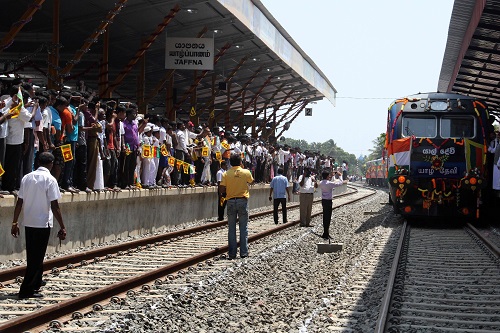Ircon, one of many Indian firms involved in SL projects
View(s):Mumbai,(Hindustan Times.com) When the train “Queen of Jaffna” arrived in the city of Jaffna in northern Sri Lanka, home to the ethnic Tamil population, last week after a gap of almost 24 years, it not only marked a significant milestone for the country, but also for India’s contribution to rebuilding infrastructure in the island nation that has been ravaged by a three-decade-long civil war between government troops and Tamil rebels.
Several sections of the 339 km long railway line linking capital Colombo to Jaffna were built by Ircon International Ltd, an Indian government-controlled company that specialises in transport infrastructure.
Ircon is executing four rail projects in Sri Lanka worth almost $800 million.
“Ircon is mainly executing railway infrastructure projects in the northern part of Sri Lanka-the lines reaching up to Jaffna and others. A lot of this infrastructure was destroyed during the conflict,” said David Rasquinha, deputy managing director, Export-Import (Exim) Bank of India, which is financing the projects. Ircon officials were not reachable on the phone. An email sent to the company remained unanswered.
Ircon is one of the several Indian companies that are involved in projects to rebuild crumbling infrastructure in Sri Lanka. Power producer NTPC Ltd, heavy equipment maker BEML Ltd, Tata Housing Development Co. Ltd, Larsen & Toubro Ltd, UltraTech Cement Ltd, water infrastructure company VA Tech Wabag Ltd are among other Indian companies that are developing projects in the island country.
Railways, water, and power generation, transmission and distribution are among the most promising opportunities in Sri Lanka, according to Rasquinha.
To help Indian companies capitalise on this opportunity, India has extended a credit line of $1 billion to Sri Lanka through the Exim Bank of India for various infrastructure projects, the highest for any country in South Asia.
Credit is also extended through the “Buyer’s Credit” programme of Exim Bank.
Under this programme, loans amounting to almost Rs.2,800 crore have been provided in the last two years to Indian companies looking to execute projects in Sri Lanka.
One sector, in particular, where interest is high is water infrastructure.
In the last few weeks, Ion Exchange (India) Ltd and Pratibha Industries Ltd have won orders worth around $400 million in Sri Lanka and several such projects are in the pipeline. Ion Exchange won a $194 million (Rs.1,180 crore) order, while Pratibha Industries won a $200 million order. Both orders were for building water supply infrastructure.
Water infrastructure projects worth approximately Rs.21,000 crore are in the pipeline, according to data available on the website of Sri Lanka’s National Water Supply and Drainage Board.
“It is only after the war that the Sri Lankan market has really opened up.
The political class in Sri Lanka is looking for development of the country and when you talk about development, the basic requirement that comes up is water and sanitation,” said Ravi Kulkarni, a director of Pratibha Industries, which is bidding for two-three more projects in the country.
Sri Lanka is definitely a good market when it comes to water infrastructure and housing, he added.
Pump maker Kirloskar Brothers Ltd is also actively scouting for projects in the water sector in Sri Lanka, according to Sanjay Kirloskar, chairman and managing director.
VA Tech Wabag is currently executing a $90 million water-supply project that is expected to be completed next year.
“The water sector is on priority for investment in smaller developing countries like Sri Lanka and even institutions like the World Bank have significantly large programmes in such countries,” said Vishwas Udgirkar, senior director at consulting firm Deloitte Touche Tohmatsu India Pvt. Ltd. Funded by the World Bank or other multilateral agencies, these projects require international bidding which gives an advantage to companies with expertise in these areas and companies based in India also have the added advantage of being located geographcally close, he said.
While the opportunity is large, Indian companies face challenges especially while competing with Chinese firms bidding for the same projects.
India’s companies also have limited access to cheaper funds compared to China, partly because of the country’s lower sovereign rating.
“Sri Lanka like many other countries wants very competitive concessional rates of interest. At the end of the day Exim and India are rated BBB-and when we raise money we have to raise it at BBB- rates. But China is rated much higher than India and they can lend money at rates which we can’t even borrow at. So there will always be a pricing differential between India and China or India and Korea,” said Rasquinha.
“China is doing a lot of projects in Sri Lanka and these are projects which could very easily have been done by Indian companies,” he said.
Rasquinha believes that Indian companies need to be more proactive in Sri Lanka to fight off Chinese competition. “It’s a good business, you have a geographical advantage, you have a cultural advantage. The country is doing well, there are no repayment issues. So we would like to see Indian companies be more aggressive in Sri Lanka.”


